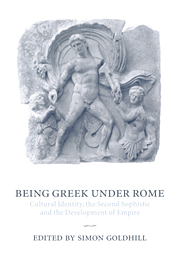Introduction: Setting an agenda: ‘Everything is Greece to the wise’
Published online by Cambridge University Press: 22 January 2010
Summary
Three pairs of snapshots, to begin with:
Lucian, a Syrian from Samosata on the Euphrates, and one of the stars of this book, made a career as an orator in Rome and the Empire. His work, the Anacharsis, written in the middle of the second century CE, has a dramatic setting in Athens of the sixth century BCE, and is a dialogue between Solon, one of the founding fathers of classical democracy, and Anacharsis, a visiting Scythian sage, about athletic exercise. Anacharsis, seeing citizens roll around in the dust naked, fighting, hitting each other, ‘like pigs’, wonders about the point of such bizarre behaviour. Solon tries to explain the rationale of the gym to the incredulous Scythian, who points out sharply what punishment would be meted out in Scythia to anyone who thus physically abused a citizen. Naked exercise in the gymnasium was one of the key signs of Greek culture (exported throughout the Mediterranean in the wake of Alexander), along with the theatre (also mocked by Anacharsis (22)) and the symposium. Although there is a long Greek intellectual counter-tradition of questioning the value of athletics (as well as a long, fully institutionalized support for it), for many Roman writers it remained a distinctly suspicious and peculiarly Greek activity: not only was its association with Platonic philosophy and its amours difficult to fit into Roman ideals of manhood, but also its role as preparation for war (which Solon emphasizes) was unconvincing to the conquering Rome.
- Type
- Chapter
- Information
- Being Greek under RomeCultural Identity, the Second Sophistic and the Development of Empire, pp. 1 - 26Publisher: Cambridge University PressPrint publication year: 2001
- 23
- Cited by

